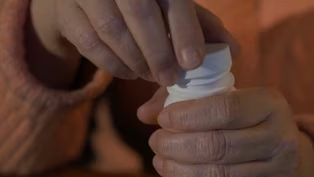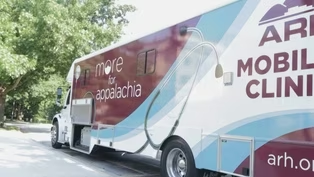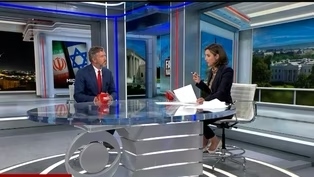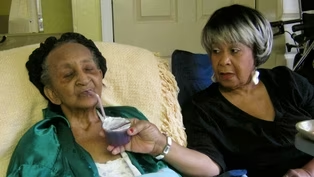
Heat Wave Grips the Commonwealth
Clip: Season 3 Episode 278 | 5m 29sVideo has Closed Captions
How long will it last, and what can you do to beat the heat?
A brutal heat wave is hitting Kentucky this week with the heat index surpassing 100 degrees. Christie Dutton finds out how long it will last and what you can do to beat the heat.
Problems playing video? | Closed Captioning Feedback
Problems playing video? | Closed Captioning Feedback
Kentucky Edition is a local public television program presented by KET

Heat Wave Grips the Commonwealth
Clip: Season 3 Episode 278 | 5m 29sVideo has Closed Captions
A brutal heat wave is hitting Kentucky this week with the heat index surpassing 100 degrees. Christie Dutton finds out how long it will last and what you can do to beat the heat.
Problems playing video? | Closed Captioning Feedback
How to Watch Kentucky Edition
Kentucky Edition is available to stream on pbs.org and the free PBS App, available on iPhone, Apple TV, Android TV, Android smartphones, Amazon Fire TV, Amazon Fire Tablet, Roku, Samsung Smart TV, and Vizio.
Providing Support for PBS.org
Learn Moreabout PBS online sponsorshipWell, a brutal heat wave is hitting Kentucky this week.
You've probably felt it with heat index temperatures above 100 degrees.
Our Kristy Dutton finds out just how long it will last and what you can do to beat the heat.
After the first weekend of summer, we're already complaining about the heat.
Michael Koszyk from the National Weather Service in Louisville is here.
Okay, Mike.
Well, we have heat advisories going on.
We have excessive heat warnings just outside of the area.
What does that mean and what kind of heat are we looking at this week?
We have a big dome of high pressure summer has arrived in a hurry, and it's all over the place.
Northeast, all the way down here into Kentucky and Tennessee.
So we're looking at highs in the 90s.
Heat indexes of 105, maybe even more than 105.
So really oppressive heat for several days.
Okay.
And so you said several days.
Is this going to be are we talking about heat index centers?
It's going to feel like the triple digits for the rest of the week or.
Yeah, yeah.
So so heat index.
What that is, is you have your daytime high temperatures, but then with the humidity that's the real feel.
That's what it really feels like.
So yes you're talking about afternoon temperatures in the above 100 triple digits maybe 105 maybe 110.
Some spots.
We'll see.
Why is it the humidity makes it feel hotter?
It's because you can't evaporate the sweat from your skin as much when there's that much humidity in the air, so it just makes you feel hotter.
Your body has a really hard time cooling down, and that's where we can see some trouble this week.
Yeah, that's right.
That's why pools are so great.
You dive in and you get wet, and then that evaporation is a cooling process, but without the humidity, you can't evaporate that sweat.
So you just keep getting hotter, it seems like.
And so with heat advisories, what do we need to watch out for?
Who is most vulnerable and how do we stay cool?
So all of Kentucky is really under this oppressive heat and humidity.
And the most concerning thing is that we're not going to see much cooling overnight.
The low time temperatures usually we're used to, you know, open in the windows at night and kind of cooler weather that's not really on the table for this week at all.
So elderly are much concerned.
You know, we're watching those folks and younger folks as well, you know, infants and things.
They don't have the immune systems that we have, you know, typically like healthy adults.
So any folks with like illnesses or, you know, concerns about their physical health, they should really be taking care, okay.
And this is also the time of year where we talk about, cards, you know, the heat, how much it heats up inside the car, and just reminding people about kids and pets and cars.
Right.
It is so important to look before you lock.
It can happen to anyone.
It happens to doctors, lawyers, you know, you just forget you get busy and your infants in the back and 80% of the heat that happens.
The oppressive heat in a car happens in the first 30 minutes.
So it happens within a flash.
Don't even nodding for a minute.
Should you let your child alone?
Or pets, you know, make sure you look before you lock.
Okay, so when is any relief headed our way?
Do you see anything in the future that may give us a break from this oppressive heat?
Maybe by next weekend.
But summer's here and summer came here in a hurry, so, I think it's going to be here to stay for a little bit.
And we just got to practice our heat safety.
You know, stay away from outdoors if you can.
The best you can between 10 and 6 is usually when the sun is at the highest angle for sunburn things.
But if you can avoid outdoors, if you work outside, take frequent rest breaks.
Find shade, drink plenty of water, a lot of water.
Probably more water than most of us think.
Is safe.
So.
And I also heard that sunscreen can actually keep your skin a little bit cooler, that that block from the sun.
It certainly can.
But, I will say, if you're out in the direct sunlight, it feels hot, no matter if you have sunscreen on or not.
So be sure to know where your shady spots are, or maybe even your cooling places.
Cooling centers.
If you are outside and you don't have access to a lot of that, called local emergency management, they can tell you where, you know, the government buildings are that you can go and cool off.
Another thing with all this heat, oppressive heat is that we don't have any wind, and without the wind or a storm, do kind of circulate the air.
A lot of times we start seeing the air quality pollution start to get bad to.
And so how is that going to factor in?
Certainly.
So, you know, when you have all these vehicles riding around that certainly, you know, afternoon especially with the heat and the stagnant air like you said.
So if you're outside exercise especially that's who it affects a lot.
Make sure you exercise in the morning or the later evening hours if you have to get out.
But otherwise, yeah, if you're super sensitive to gas smells or other things, air pollutants, then try to stay inside as much as you can.
Okay?
And we will just wait for some wind to pick up or a storm system to move through or something.
But until then, we'll make sure that we stay weather aware, that we keep in mind all those heat safety tips and that we try to take frequent, frequent breaks.
Right?
Absolutely.
Out of the heat.
Michael Kozak from the National Weather Service, thank you so much for being here.
Thanks for having us.
Thank you.
Thank you Christy.
And it is important that you know the signs of heat exhaustion and heat stroke, especially if you do spend time outdoors.
Heat exhaustion occurs when your body heats too quickly to cool itself off.
Dizziness, heavy sweating, and weakness are just a few of the symptoms of heat exhaustion.
If impacts from the heat continue, a heat stroke is possible.
Confusion, dizziness, and losing consciousness are all signs of a heat stroke.
Now, if you suspect someone is suffering from a heat stroke, call 911.
Immediately move the victim to a cooler location if possible.
Campaign Focuses on Safe Medication Storage
Video has Closed Captions
Clip: S3 Ep278 | 2m 38s | Kosair for Kids is partnering with several organizations to spread the word. (2m 38s)
New Mobile Clinic Serving Eastern Kentucky
Video has Closed Captions
Clip: S3 Ep278 | 4m 5s | Governor Beshear attended the ribbon cutting for the new mobile clinic. (4m 5s)
Rep. Massie: U.S. Bombing Iran Is Unconstitutional
Video has Closed Captions
Clip: S3 Ep278 | 4m 32s | The congressman from Kentucky is one of the most outspoken critics of Saturday's strike. (4m 32s)
The Ups and Downs of Caring for a Loved One
Video has Closed Captions
Clip: S3 Ep278 | 3m 17s | Laura Rogers spoke with a family caregiver who's sharing her experience. (3m 17s)
Providing Support for PBS.org
Learn Moreabout PBS online sponsorship
- News and Public Affairs

Top journalists deliver compelling original analysis of the hour's headlines.

- News and Public Affairs

FRONTLINE is investigative journalism that questions, explains and changes our world.












Support for PBS provided by:
Kentucky Edition is a local public television program presented by KET



